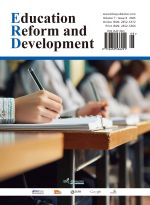The Educational Philosophy and Methods for Cultivating High-Quality College Students
Abstract
Pursuing academic excellence is a worthy challenge, but cultivating integrity demands wholehearted commitment. In the realm of education, the principle of leading by virtue, embodied in both words and actions, should remain a constant guide for educators. Ideological and political education must integrate both general instruction and personalized approaches to effectively reach all students. Emotional engagement plays a pivotal role in this process, harnessing the power of empathy and humanistic care to create meaningful connections that support and influence students. This emotional resonance serves not only as a fundamental strategy but also as a necessary condition for success in ideological education. This paper explores how to enhance students’ ideological and moral development, as well as promote their overall growth in higher education, through the seamless integration of verbal guidance and exemplary behavior, reinforced by emotional connection. The study concludes that class teachers, as the cornerstone of ideological and political education, should emphasize alignment between what they say and what they do. By fostering emotional rapport, educators can more effectively cultivate students’ moral values and support their all-around development—morally, intellectually, physically, aesthetically, and in practical labor.
References
Wang Y, 2022, Role Positioning and Path Innovation of University Head Teachers in Ideological and Political Education of College Students. Theory and Practice of Education, 42(14): 52–55.
Li H, 2021, Study on the Effectiveness of Head Teachers’ Work in Ideological and Political Education in Colleges and Universities. Ideological and Political Education Research, 37(3): 68–71.
Zhang J, 2020, The Value of Teaching by Word and Example in Moral Education in Colleges and Universities. University Education Management, 14(6): 87–90.
Liu Y, 2022, Innovative Paths of Ideological and Political Education in Colleges under the Perspective of Emotional Education. Educational Observation, 11(12): 112–115.
Chen X, 2020, Practical Dilemmas and Optimization Strategies of Moral Education Work by University Head Teachers. Education and Vocation, 2020(23): 73–76.
Hu Z, 2021, Integration Paths of Humanistic Care and Psychological Counseling in College Ideological and Political Education. Ideological and Theoretical Education, 2021(9): 56–60.
Zhou Y, 2020, Study on the Effective Function of Head Teachers in Ideological and Political Education in Colleges and Universities. China Higher Education, 2020(3): 85–87.
Feng Z, 2022, Emotional Expression and Teacher-Student Relationship Construction in College Ideological and Political Education. School Party Building and Ideological Education, 2022(12): 45–48.
Wang J, 2021, Analysis of the Role of Emotional Labor by Head Teachers in Ideological and Political Education of College Students. Youth and Society, 2021(5): 110–112.
Xu L, 2020, Rethinking “Teaching by Word and Example” from the Perspective of Ideological and Political Education. Teacher Education Forum, 3(2): 92–95.
Liu Y, 2021, Systematic Optimization of the Student Development Mechanism of University Head Teachers. Educational Modernization, 8(30): 144–146.
Xu Q, 2022, Emotional Path Analysis in the Work of Ideological and Political Education in Colleges. University Education, 2022(2): 59–61.
Wang J, 2020, An Analysis of the Ideological and Political Education Function in Class Culture Construction in Colleges and Universities. China Adult Education, 2020(16): 89–91.
Guo L, 2021, Paths and Mechanisms of Emotional Education in Moral Education Practice in Colleges. China Educational Technology, 2021(6): 78–81.
Ma X, 2022, The Guiding Role of University Teachers’ Exemplary Behavior in the Value Education of Students. Contemporary Education Forum, 2022(8): 102–104.

